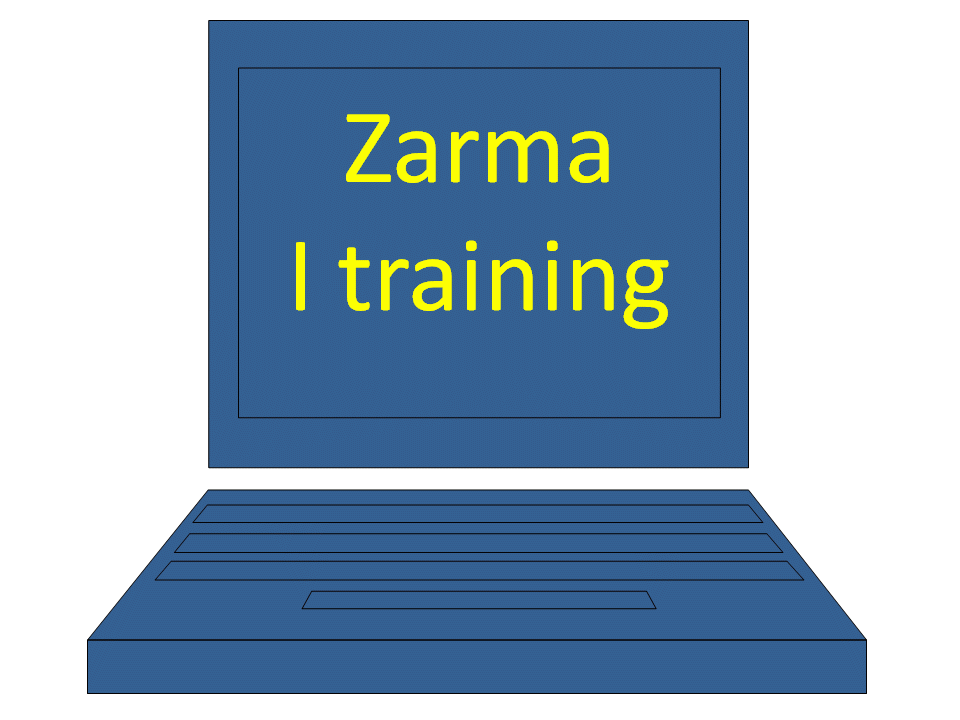
Grammar help
The verb 'to be' |
|||||||||||||||||||||||||||||||||||||||||||||
The verb 'to be' in English is an auxiliary verb (continuous and passive auxiliary verb) and also a linking verb. In point of fact the Zarma language only has a linking verb 'to be'. First the theory is discussed about how auxiliary and linking verbs are contructed in Zarma and subsequently the theory is illustrated with examples.
|
|
||||||||||||||||||||||||||||||||||||||||||||
Auxiliary verb |
|||||||||||||||||||||||||||||||||||||||||||||
Theory'The auxiliary verbs of time 'to be' and 'will" do not exist in Zarma. The auxiliary verb of tense is indicated with particles in Zarma. In Zarma in general tense is indicated by particles (auxiliaries) or by context while in English tense is indicated by conjugation of auxiliary verbs of tense. The passive voice does not exist in Zarma. In Zarma the active voice using the third person plural pronoun also has a passive voice denotation. Therefore a Zarma sentence in the active voice with the third person pronoun might be translated to an English sentence in the passive voice. |
|||||||||||||||||||||||||||||||||||||||||||||
Examples: Tense auxiliary verb |
|||||||||||||||||||||||||||||||||||||||||||||
|
The auxiliary verb 'to be' as such does not exist in Zarma. The page "conjugation of verbs" shows tense auxiliaries, i.e. particles, used in a similar way to the auxiliary verb 'to be in the continuous form in English. In Lesson 5.D.3 the present and in Lesson 15.C.2 the past continuous form is discussed. Some examples are given below.
|
|||||||||||||||||||||||||||||||||||||||||||||
Examples: Passive auxiliary |
|||||||||||||||||||||||||||||||||||||||||||||
Strictly speaking, there is no passive voice in Zarma. The effect of a passive, in a sentence where the agency is not specified, can be achieved by using the third person plural pronoun 'i'' (they) as the subject, in the same way we use 'they' for an indefinite pronoun (as in 'they say that ...'). Some examples are given in the next table. For more examples see Lesson 6.D.3.
|
|||||||||||||||||||||||||||||||||||||||||||||
Linking verb |
|||||||||||||||||||||||||||||||||||||||||||||
TheoryMain forms Tense Special forms The combination 'ya ... no' is a special form of the verb 'to be'. When the verb 'no' has its subject stated and not implied (it is, he is, they are, etc.) the auxiliary 'ya' must follow the subject. It is used, for example, to tell your origin or nationality, the place where you come from, or your occupation. In certain regions one may hear 'wo .. no' in stead of 'ya ... no'. The negative of 'ya ... no' is formed by adding 'manti'. Some people use the short form without 'ya'. The combination 'ga ti' has the effect that the predicate identifies the subject. It is a linking verb with the same function in it's sentence that 'no' has at the end of the sentence; it is fully interchangeable with 'no', except for position. The government’s regulation on how it is to be spelled notwithstanding, this verb is usually pronounced by Zarmas as 'kaci'. |
|||||||||||||||||||||||||||||||||||||||||||||
Examples: linking verb |
|||||||||||||||||||||||||||||||||||||||||||||
|
|||||||||||||||||||||||||||||||||||||||||||||
GO and GO NO "go no" is used to show absolute existence; it nearly equals French "il y a".
"go" is used along between the subject and predicate nominative to indicate locations.
Note: |
|||||||||||||||||||||||||||||||||||||||||||||
| back | |||||||||||||||||||||||||||||||||||||||||||||
GO NO past and future As 'go no' has no tense indicators the context might give an indication. The past and future of "to be" is frequently shown by the verbs 'ciya' (to become), 'te' (to make) or 'goro' (to sit) with the appropriate tense indicators. This is in addition to their regular uses as verbs (see Lesson 22.C.5).
|
|||||||||||||||||||||||||||||||||||||||||||||
| back | |||||||||||||||||||||||||||||||||||||||||||||
NO 'no' with a predicate nominativeWith a predicate nominative 'no' is very like the French 'c'est' and 'ce sont'. No subject is needed when it is understood to be the third person pronoun. If the subject of this 'no' verb is stated, there is a special auxiliary, 'ya'. This verb comes at the end of its clause, and is the most widely used, especially being added for emphasis, where we would let the main verb carry it.
Predicate nominative is a pronounWhen the predicate nominative is a pronoun, the same construction is used as above. The long forms of the third person pronouns are used with this verb.
|
|||||||||||||||||||||||||||||||||||||||||||||
| back | |||||||||||||||||||||||||||||||||||||||||||||
GA and NO When there is a predicate adjective (describing the subject) the particle 'ga' is used to link the subject to its attribute, rather than a verb. In translation it becomes the verb 'to be'. For emphasis a 'no' may be added after the adjective.
|
|||||||||||||||||||||||||||||||||||||||||||||
| back | |||||||||||||||||||||||||||||||||||||||||||||
YA ... NO (WO ... NO) GeneralThe combination 'ya ... no' is a form of the verb 'to be' used when the verb 'no' has its subject stated and not implied, e.g. to tell or ask someone's origin or nationality, the place where the person comes from, or his or hers occupation. The short form of the third person singular and plural personal pronoun, 'a' and 'i', are not used in combination with 'ya ... no', but only the long forms 'nga"' and 'ngey'. Note: In certain regions one may hear 'wo .. no' in stead of 'ya ... no'. Express nationalityTo express your nationality or the origin of someone, there are two ways to tell this. You could say 'He is English' or 'He is an Englishman'. In Zarma this is similar.
To express the place you're fromTo tell someone the place where you come from you use 'ya ... no' as well in combination with the name of the place were you come from: 'Ay ya <name of place> boro no'.
To express your occupationFinally, the form 'ya ... no' is used to tell someone your occupation: 'Ay ya <occupation> no'.
Interrogative formThe form 'ya ... no' is invariable and can be used for phrases in affirmative and interrogative form.
|
|||||||||||||||||||||||||||||||||||||||||||||
| back | |||||||||||||||||||||||||||||||||||||||||||||
GA TI The Zarma verb 'ga ti' is translated by the present forms of the verb 'to be'. It has the effect that the predicate identifies the subject. It is a linking verb with the same function in it's sentence that 'no' has at the end of the sentence; it is fully interchangeable with "no", except for position. The government’s regulation on how it is to be spelled notwithstanding, 'ga ti' is usually pronounced by Zarmas as 'kaci'.
|
|||||||||||||||||||||||||||||||||||||||||||||
| back | |||||||||||||||||||||||||||||||||||||||||||||
Negative of GO NO, GO and NO Sometimes the negative is formed by using 'si' and other times by using 'manti'. SI NOTo show absolute existence (French 'il y a') the form 'go no' is used. This changes to 'si no' to form the negative.
SIThe form 'go' is used along between the subject and predicate nominative to indicate locations. The negative is formed by replacing 'go' by 'si'.
MANTIWhen a noun is used as a predicate nominative and the 'no' form is used, 'manti' is used instead of 'si' to make the negative.
|
|||||||||||||||||||||||||||||||||||||||||||||
| back | |||||||||||||||||||||||||||||||||||||||||||||
Negative of GA When there is a predicate adjective (describing the subject) the particle 'ga' is used to link the subject to its attribute, rather than a verb. In translation it becomes the verb 'to be'. The negative form of 'ga' is 'si'.
|
|||||||||||||||||||||||||||||||||||||||||||||
| back | |||||||||||||||||||||||||||||||||||||||||||||
Negative of verb YA ... NO When the verb 'no' has its subject stated (and not implied) the auxiliary 'ya' must follow the object. The negative of 'ya ... no' is formed by adding 'manti'. Some people use the short form without 'ya'.
|
|||||||||||||||||||||||||||||||||||||||||||||
| disclaimer | contact | ||||||||
| Dico Fraters, the Netherlands © 2004-2016 | |||||||||
|
|
|||||||||





